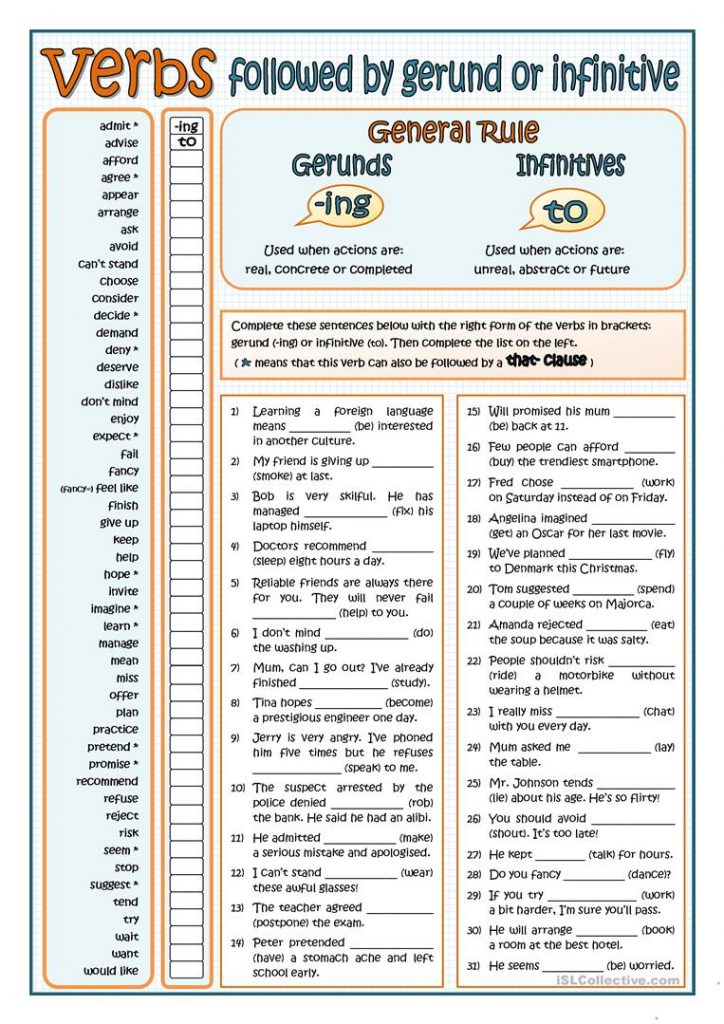
© frederick lynch
| Basic: infinitives & gerunds | |||
| When we have 2 consecutive verbs, some verbs lead to an infinitive and some to a gerund. | |||
verbs that are followed by an infinitive + to
phrases that are followed by an infinitive without to Would rather Needn’t Had better |
verbs that are followed by a gerund – ing
|
||
| Some verbs can be followed by an infinitive or a gerund and the meaning changes. | |||
|
Begin She began singing. She began to sing. Dread I dread going to the dentist. I dread to think. Forget Sarah forgot travelling to London when she was a child. Sarah forgot to pay her phone bill. Keep Danny kept talking. My neighbours kept a hunting dog to scare off intruders.
Need The house needs cleaning. He needs to call his parents. |
Regret I regretted being late to the interview. We regret to inform you that your position at the company is being eliminated. Remember I remember meeting him last year. He remembered to call his parents on their anniversary.
Start Marc started talking really fast. Marge started to talk really fast. Stop His doctor told him to stop smoking. He stopped to smoke a cigarette.
Try I tried learning Japanese but it was too difficult. I tried to speak Japanese but I couldn’t remember anything from my lessons. |
||
GOLDEN Rule: Only gerunds are used after prepositions (except but) MAJOR DIFFERENCE WITH ESP.
|
|||
Advanced infinitives and gerunds
Use 1: different from esp. (they use subjunctive)
Odio que me digan que necesito vestirme mejor – I hate being told that I need to dress better.
Necesito que me revisen el coche – My car needs to be checked.
- We use passive gerunds (being done) or passive infinitive (to be done) to describe actions which are done to the listener. You can use either of the two forms…
She hates/enjoys/ loves being beaten
She hates to be beaten
She hates being told ‘no’ (alt: she hates it if you criticise her – no difference)
She hates to be criticized
Use 2: different from esp but not so much
- Les dimos las gracias por haber pasado tanto tiempo con nosotros. We thanked them for having spent so much time with us.
- Haber aprendido conducir me facilita visitar todos mis tios y primos en Catalunya. Having learned to drive makes it easier for me to visit all my uncles and aunts in Catalonia.
- Es genial haber asistido al curso de ese guapeton, Lynch.
- We use a perfect gerund (having done) or a perfect infinitive (to have done) to emphasise an action is completed or in the past. The perfect gerund refers to a time before that of the verb in the main clause. However, it is only used if the time of the action expressed by the gerund is not obvious from the context:
She denied having sent the hate mail. (note no difference with ‘she denied sending the hate mail.)
Having already met her, I was able to get her number more easily.
It’s a fantastic feeling to have completed the course.
By the end of the year, I hope to have finished level 2.
Use 3: Same as esp. (Minor change with ‘rather.)
Me gustaría haber dado la mano a Muhammad Ali cuando le vi en Las Vegas.
Habrian preferido volar a ir por coche- They would rather have flown than gone by car.
We also use the perfect infinitive to talk about your emotions with respect to an earlier action you wish you’d done or not done
Would like: I would like to have visited the cannabis museum.
Would love: I would love to have visited the cannabis museum.
Would hate: I would hate to have visited the cannabis museum.
Would rather: I would rather have visited the cannabis museum. (‘rather’ kills ‘to’)
Would prefer: I would prefer to have visited the cannabis museum.
Use 4: Same as esp.
le gustaría estar bailando con sus amigas pero no puede.
- We use a continuous infinitive to express actions that are current: esp with certain verbs
I’d like to be drinking a beer right now with Selena Gomez.
She seems to be talking a lot. Is she drunk?
I suppose she wants to be dancing right now.
I’d prefer to be sailing than studying.
Use 5: Different in esp as they use infinitive
- No tiene sentido estudiar esa asignatura – There’s no point in studying that subject.
- No sirve de nada hablar con esta tia. Ella es muy despistada – It’s no good talking with that girl. She’s very stubborn.
- ¿Tenía algún sentido confesar? Was there any point in confessing?
- We use the gerund after certain expressions with ‘there’ and ‘it’
There’s no point in calling her because she won’t pick up the phone.
It’s no use crying.
There’s no sense in doing it again.
Use 6: Same as esp.
Nuestra esperanza es llegar a las 6 en punto.
El acuerdo es pagarles 6 millones de dólares.
- We use the infinitive after nouns which come from verbs which also use the infinitive e.g. hope, agree, plan etc
Our hope is to arrive at 6‘ O’clock
The agreement is to pay them 6 million dollars.
Our plan is to excite them with our fascinating conversation.
Use 7: Same as esp.
No había suficiente gente para montar una fiesta – there weren’t enough people to make it a party
- We use the infinitive after expressions with quantifiers such as enough, too much, a lot, plenty of…
There’s plenty of things to do in Paris.
I’ve got a lot of e-mails to send.
Despite the terrible salary of an English teacher, I have enough money to pay the gas bill.
Use 8: Same as esp.
Tienes algo de comer – Have you got anything to eat?
No hay nada que hacer, tio! – there’s nothing to do, dude.
- We use the infinitive after ‘anywhere’ and ‘somewhere’ etc.
He’s got nowhere to go now that his ex has kicked him out.
Have you got something to light the BBQ with?
Can anybody find me somebody to love?
Use 9: Same as esp.
No sabe con quien hablar ni que hacer – she doesn’t know who to speak to or what to do.
- We use the infinitive after question words such as ‘when’ and ‘who’ (but not ‘why’)
I’ll tell you when to call him but not what to say.
They asked me what to do but I didn’t know.
They asked me what to buy him for his birthday.
Use 10: Same as esp.
Es la cantante más joven en ganar La Voz. – She’s the youngest singer to win La Voz
- We use the infinitive after superlatives and first, second, third etc.
She was the first girl to kiss me.
He was the best teacher to get the job done.
He was the coolest teacher to walk the face of the earth.

Comments are closed.